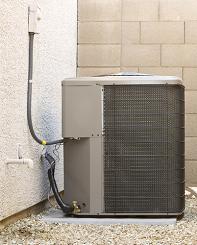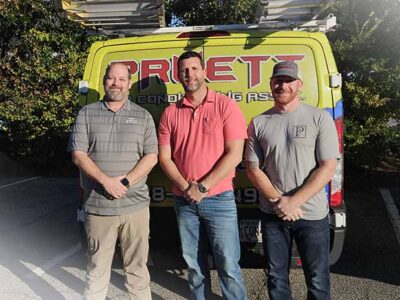
Heat pump features begin with an energy-saving system that produces up to four units of heat for every one unit of electricity it consumes, while offering high-efficiency cooling in the summer. But that’s not where the advantages of upgrading end. In the HVAC industry, many cutting-edge advances are widely incorporated first in heat pump technology. Upgrading to a heat pump allows you to choose from these features that substantially improve efficiency and performance.
Compressor Options
Low-tech piston compressors use lots of energy, incur heavy wear and tear, and often deliver shorter service life. Operating at 100 percent output only, piston compressors cycle on and off frequently. Scroll compressors deliver full output only when the cooling or heating load demands, automatically shifting to reduced output most of the time. Electrical consumption is reduced, and likewise component wear and noise.
Variable Speed Blowers
Single-speed HVAC blowers utilize on/off motors. When it’s on, output is maximum. When the system shuts off, all air circulation ceases. Temperature swings in living spaces are often as much as 10 degrees as the system cycles. Variable speed heat pump blowers use electronically commutated motor technology to run continuously across a range of outputs, while consuming about one-third less electricity. Continuous output means more consistent temperatures than on/off operation. It also means improved air filtration and humidity control.
Desuperheater
Extra heat energy extracted from the air by a heat pump can be put to additional use. A desuperheater converts waste heat into energy to heat water. In summer, a desuperheater can usually provide all of a home’s hot water needs at no extra energy cost. During winter, it will augment your standard water heater to reduce hot water expenses.
Backup Heat Choices
With most heat pumps, supplemental heat is required when temperatures drop below 30 degrees. Most heat pump systems utilize electric resistance coils to take over the heating function. However, more cost-effective backup gas furnaces can also be incorporated with a heat pump in a configuration called a “dual-fuel” system. Because natural gas is less expensive than electricity almost everywhere, these systems provide the least costly backup heat when necessary.
For more information on upgrading to advanced heat pump features, contact Pruett Air Conditioning. Warner Robins and Eastman area homeowners have come to expect top-quality service from our technicians.
Image Provided by Shutterstock.com

